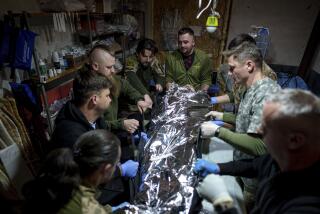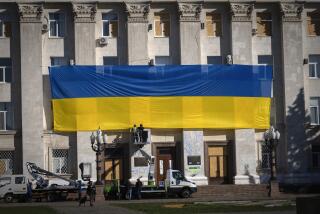Chechen Leader Defiant as Battles Flare Outside Capital : Russia: He calls sovereignty ‘a matter of life or death.’ As casualties rise, not all in the breakaway republic agree.
- Share via
GROZNY, Russia — As the outskirts of his capital erupted in battle with encircling Russian tanks, the leader of the tiny Muslim republic of Chechnya clung defiantly Tuesday to his demand for independence from Moscow.
“Sovereignty is a matter of life or death for our people,” Gen. Dzhokar M. Dudayev said in an interview in his presidential palace. “The Chechens are created in such a way that without their freedom and their independence they cannot exist in nature.”
Fighting was reported Tuesday near villages on three sides of Grozny as Russian armored columns opened fire on Chechen guerrillas and civilians in the worst combat since troops entered the mountainous republic Sunday morning.
At least eight Chechens and nine Russians were reported killed, though casualty figures are incomplete.
The stated aim of the occupation is to disarm this republic of 1.2 million people, where toting a gun is a daily habit for tens of thousands of adult males.
The Russian forces, consisting of three columns and hundreds of tanks, appeared intent on surrounding this capital of 400,000 people--with the additional aim of forcing Dudayev to renounce the independence he declared when the Soviet Union broke up three years ago, and to join the Russian Federation.
But the siege stirred no visible ripple of concern in Dudayev, a 50-year-old former Soviet nuclear bomber pilot with a pencil-thin mustache and a cool, almost detached manner of explaining his historic and possibly suicidal mission of ethnic rebellion.
Wearing camouflage combat fatigues and huddling near an electric heater in a frigid ninth-floor office, Dudayev spoke for more than an hour, heaping scorn on Russian President Boris N. Yeltsin for stumbling into a shooting war and on President Clinton for dismissing the conflict as an internal Russian problem.
Dudayev sounded as if he welcomed the Russian offensive and the controversy it is stirring in Moscow. “We made the Russian regime go to extreme and wild measures that will eventually cause its collapse,” he declared. “The regime in Russia is in agony.”
“What should I worry about?” he said. “It’s the entire Chechen people who are fighting, and I am just one of them. Everything is in the hands of Allah.”
The presidential office was decorated with a green Muslim flag, a pendulum clock frozen at 11:45 and a portrait of Sheikh Mansur, the Chechen who led an 18th-Century rebellion against Russia. It took the czarist regime three decades of fighting in the 19th Century to subdue the Chechens and complete Russia’s conquest of the Caucasus Mountains. Afterward, czars and Soviet rulers carried out several mass deportations aimed at breaking militant Chechen nationalism.
Dudayev said that Moscow’s current plans to evacuate unarmed civilians from war zones in Chechnya are simply another deportation campaign--a charge Russian officials heatedly denied.
“Who are they saving us from?” Dudayev asked. “They are the ones who are dropping bombs on our women and children.”
Dudayev said that universal acceptance of Chechen independence--recognized so far only by the former Soviet republic of Georgia--would help protect his people’s human rights.
Peace talks remained deadlocked Tuesday as Russian and Chechen negotiators argued over whether Chechnya must agree to be bound by the Russian constitution and disarm. Russian officials said the Chechens must disarm before Russian troops will be withdrawn. The Chechens demanded troop withdrawal before disarmament.
Acknowledging that Islamic fundamentalists from Afghanistan and the Middle East have joined in the defense of Grozny, Dudayev said they wouldn’t need to be here if Clinton had taken Chechnya’s side. He called the American President “a very shortsighted person.”
“When the world provides no protection against their exterminators, people are left with only one choice--to get together with Allah and rise up,” Dudayev said. “They want to call this extremism, but you cannot deceive the people with cliches and nicknames.”
Since his inauguration as Chechnya’s elected president three years ago, Dudayev has infuriated Moscow by forming his own air force, making “state visits” to Iran and Turkey and threatening to send terrorists on suicide missions to Russia.
Authorities in Moscow view Dudayev as a dangerous maverick in the style of Libya’s Moammar Kadafi and Chechnya as a destabilizing source of arms and illegal drugs to Russia.
After trying to strangle Dudayev with an economic blockade, Moscow launched a military campaign in August--first in the guise of a Chechen opposition army, then openly.
In the interview, Dudayev denied widespread reports that he had threatened to blow up Russian nuclear reactors but vowed that “Moscow will not go unpunished” if its troops enter Grozny.
Dudayev acknowledged that the Russian economic blockade had crippled Chechnya’s economy, mainly by stopping oil exports. But he said his break with the Kremlin was justified because of the way it plundered Chechnya’s wealth under Soviet rule, leaving the republic with one of the union’s highest infant mortality rates and lowest life expectancies.
But Moscow will have a harder time hurting Chechnya militarily, Dudayev said. For example, he claimed that Chechen guerrillas had captured or disabled 170 Russian tanks in a Nov. 26 attack on Grozny that was carried out in the name of the Chechen opposition army. Independent reports confirmed that Russian losses were heavy.
The current Russian offensive is apparently far bigger than the one last month and is backed more systematically by the Russian air force, which has been trying to bomb the Chechens’ antitank artillery. The Chechens, on the other hand, appear to be fighting without clear orders or a chain of command.
“Our combat structure is difficult for you civilians to understand,” Dudayev said. “With my war experience and academy training, even I don’t understand how our people fight so effectively. One does not need to teach them. It’s in their genes.”
The week’s heaviest fighting occurred Tuesday as more than a dozen Russian tanks rumbled down a snow-covered mountain road toward the farming village of Pervomaiskoye, 15 miles northwest of Grozny, and turned back after three hours of resistance from Chechens armed with grenade launchers, automatic rifles, Molotov cocktails and one Howitzer antitank gun.
Reporters near the front line said the Russians used a Grad missile launcher to destroy the Howitzer and two nearby houses, killing at least two people.
Fighting was also reported near Chervlyonnaya, 18 miles northeast of Grozny, and in Davydenko, 30 miles to the west.
As guerrillas used construction vehicles, concrete blocks and burning tires to build checkpoints on the seven roads into Grozny, not every Chechen was infused with Dudayev’s “live free or die” spirit.
“We don’t need his sovereignty,” said Zarema Bisultanova, a 29-year-old cashier at a collective farm in Pervomaiskoye. “Sovereignty is useful only for the big shots in Grozny. It is because of their ‘sovereignty’ that my children’s school is closed and I haven’t been paid a kopeck of my wages for more than six months.”
Bisultanova was fleeing her home with her three children, her husband and his mother and aunt. As gunfire rained on the village, they fled 10 blocks to the home of a relative with a basement where they could hide.
The oldest member of the family, Kamisa Bisultanova, 79, said that three years of Chechen independence has been harder on her than the 14 years of forced exile she spent in Siberia during the dictatorship of Josef Stalin.
“It was hard but I had a job then and nobody was shooting at me,” she said.
But many Chechens interviewed here said they viewed the resistance as a just cause--even if they blamed Dudayev for acting precipitously to provoke Moscow’s ire.
“I am not saying we have to concede everything to Moscow, but a leader has to be a politician no matter what, and Dudayev is behaving more like a warrior,” said Mayerbek Nunayev, an idled construction executive who sent his wife and two sons out of Grozny but is taking no part in the fighting.
“Then again,” he added, “with the Russian troops standing right outside Grozny, he cannot help being a warrior.”
More to Read
Sign up for Essential California
The most important California stories and recommendations in your inbox every morning.
You may occasionally receive promotional content from the Los Angeles Times.













